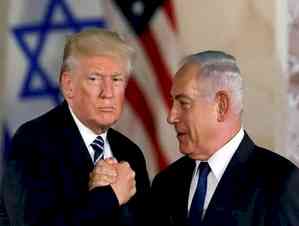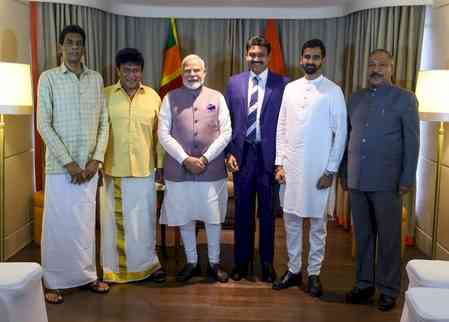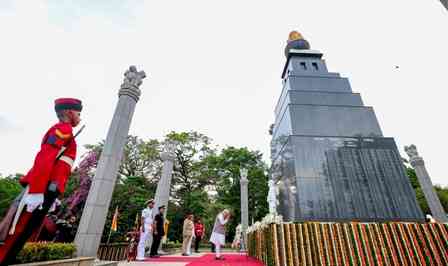The Empire Strikes Back! Indian-descent Rishi Sunak becomes UK PM on second try (IANS Profile)
More than democracy's diversity, it is colonialism's reverse sweep. The United Kingdom's Conservative Party, once intricately intertwined with the Empire, imperialism, and British national identity, had contenders from former colonies in Asia and Africa fight to lead it after Boris Johnson stepped down. And after an abortive first try, the son of Indian-descent immigrants from British East Africa finally made it to its top, to become the country's first Asian Prime Minister.

VIKAS DATTA
More than democracy's diversity, it is colonialism's reverse sweep. The United Kingdom's Conservative Party, once intricately intertwined with the Empire, imperialism, and British national identity, had contenders from former colonies in Asia and Africa fight to lead it after Boris Johnson stepped down. And after an abortive first try, the son of Indian-descent immigrants from British East Africa finally made it to its top, to become the country's first Asian Prime Minister.
Rishi Sunak, UK's former Chancellor of the Exchequer, or Finance Minister, whose sudden resignation set in motion the circumstances that forced an intransigent Johnson to finally bow out earlier this year, was initially leading in the race to be his successor.
The race had a ethnically diverse list of candidates -- British Pakistani ministers Sajid Javid and Rehman Chishti, Sunak's Iraqi Kurd-born successor Nadhim Zahawi, Attorney General Suella Braverman, whose family's roots are in Goa, and Nigerian-origin former minister Kemi Badenoch.
Sunak and Braverman's fellow Indian-origin Priti Patel, the Home Secretary, chose to sit it out.
Javid and Chishti failed to get enough traction to even figure in the race, Zahawi bowed out after the first round, and Braverman after the second, leaving Sunak and Badenoch to contend against Trade Minister Penny Mordaunt, Foreign Secretary Liz Truss, and Tom Tugendhat, the backbench MP, who happens to be half-French.
Ultimately, Sunak and Truss were the final contenders and she won after the race went to Conservative members across the country.
However, the Truss government soon imploded - and immigrants were behind it.
After she removed Chancellor of Exchequer Kwasi Kwarteng (born to Ghanian immigrants), Home Secretary Braverman subsequently resigned, with an excoriating - though half-veiled - attack on the Prime Minister. Truss chose to call it quits and while Johnson was seriously contending to run again, he refrained and Sunak, who was the earliest contender, rode it through to emerge triumphant finally.
A comparative newcomer - he only became an MP in 2015, Sunak has emphasised that the identity of a person born in the UK but with origins elsewhere matters to him.
Suave, efficient, but also controversy-ridden, the former US-based investment banker, hedge fund operator, and three-time MP has become the first non-ethnic Briton to become Prime Minister.
This, though, will not be entirely unusual -- for such staunch British PMs as Winston Churchill and Harold Macmillan happened to be half-American (on their mothers' side) and Johnson himself was born in the US, becoming the first non-UK-born Prime Minister since Andrew Bonar Law nearly a century ago (Bonar Law, however, was born in Canada, which was a part of the Empire.)
Born in Southampton on May 12, 1980, Sunak is the son of (the then British) Kenya-born Yashvir Sunak and his wife, Tanganyika-born Usha, whose grandparents were born in the Punjab Province of British India, and migrated to East Africa, and from there to the UK in the 1960s.
"My parents emigrated here, so you've got this generation of people who are born here, their parents were not born here, and they've come to this country to make a life," he said in an interview with the BBC in 2019.
"In terms of cultural upbringing, I'd be at the temple at the weekend -- I'm a Hindu -- but I'd also be at (Southampton Football Club) the Saints game as well on a Saturday -- you do everything, you do both," he said, also revealing that he was fortunate not to have endured a lot of racism growing up, save for one incident, when he was with his younger siblings.
With his father a general practitioner, and his mother, a pharmacist, he had an easy childhood. He studied at a prep school in Hampshire, and then he was at the prestigious Winchester College, where he was head boy and editor of the school paper; during vacations, he worked at a local curry restaurant.
Oxford was the next stop and he graduated in 2001. The same year, he was interviewed along with his parents for the BBC documentary "Middle Classes: Their Rise and Sprawl". He was an analyst at investment bank Goldman Sachs till 2004, and then a hedge fund management firm till 2009, when he left to join former colleagues at a new hedge fund launched in October 2010.
In 2009, he married Akshata, daughter of Infosys founder N.R. Narayana Murthy and writer Sudha Murthy, who's also the chairperson of the Infosys Foundation. Sunak and Akshata have two daughters.
Engaged with the Conservative Party since his Oxford days, Sunak got into politics full-time in 2014 when was selected for the Richmond seat in north Yorkshire -- one of the safest Conservative seats, which has been held by the party for more than a century -- and won it in the 2015 elections by nearly 20,000 votes.
He retained it in the 2017, and 2019 elections, with increased majorities. His predecessor as Richmond MP was William Hague, now Baron Hague of Richmond, who held important cabinet position, Including Foreign Secretary, and was Leader of the House of Commons,
A staunch proponent of "Leave" in the Brexit referendum of 2016 and subsequent parliamentary votes, Sunak's first government job was Parliamentary Under-Secretary of State for Local Government (2018-19) in the Theresa May government and then as Chief Secretary to the Treasury (2019-20) in the government of Johnson, whose leadership bid he had supported.
He replaced his boss Javid as Chancellor of the Exchequer in 2020, and while he mostly earned plaudits for steering the government's economic response to the effects of the Covid-19 lockdown, he also became the first Chancellor to be found to have broken the law while in office by breaching lockdown norms.
His wife's non-domicile status, which let her save huge amounts of taxes in the country, had also become a major controversy.
However, these will be seen as minor hiccups on his path to the top.
(Vikas Datta can be contacted at [email protected])


 IANS
IANS 








